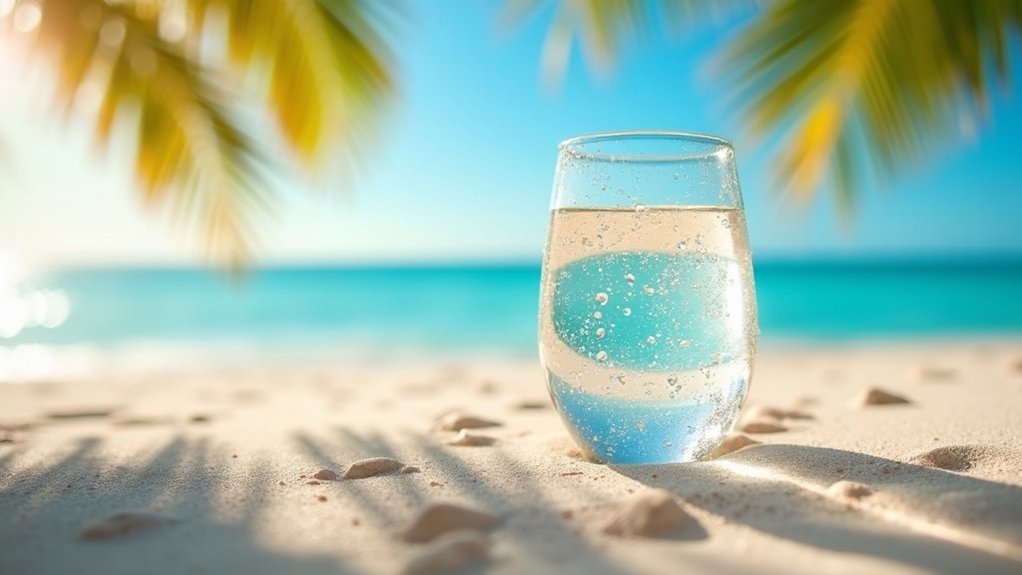If you’ve ever noticed a film on your dishes or an unusual taste in your tap water, you might be wondering about the quality of the water coming from your faucet. Many people are curious about hard water and its effects on their daily lives. Understanding water hardness is important because it can influence everything from your household appliances to your skin and hair. In certain areas, the levels of minerals like calcium and magnesium can be surprisingly high, which can lead to some common issues. Curious about how this might affect you? Let’s dive into what you need to know about hard water and how it could impact your home and health.
Understanding Water Hardness in Miami
Understanding water hardness in Miami is important for both your home and your health. The water in Miami is classified as very hard, with an average hardness of around 220 parts per million (ppm). This means that the water contains a significant amount of minerals, particularly calcium and magnesium ions.
Hard water can present some challenges for homeowners. One common issue is scale buildup in appliances and plumbing systems, which can lead to decreased efficiency and shorten the lifespan of your equipment.
You may also notice that hard water affects your skin and hair, often resulting in dryness and an imbalance of natural oils.
To help make certain the quality of water, including its hardness levels, the Miami-Dade Water and Sewer Department regularly monitors and tests the water supply. This ongoing oversight is in place to maintain safety and compliance with established water quality standards.
Miami-Dade Water Sourcing and Treatment Processes
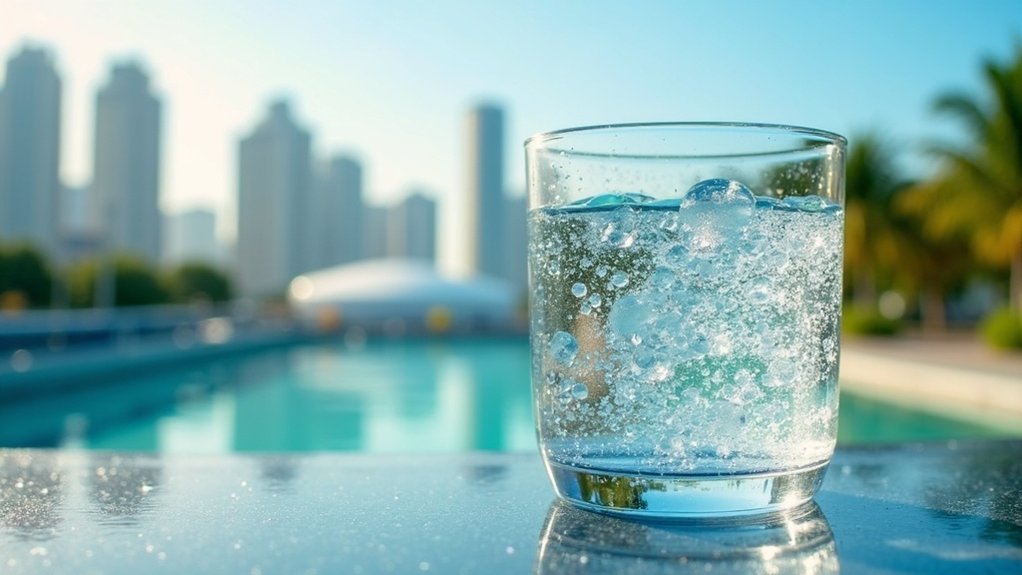
In Miami, the drinking water mainly comes from the Biscayne Aquifer, which is a limestone layer that depends on rainfall for its replenishment.
The Miami-Dade Water and Sewer Department uses various treatment methods, like coagulation and disinfection, to confirm the water meets strict quality assurance standards.
This understanding of the treatment processes helps us see how the city manages water hardness and keeps it safe for everyone.
Now that we’ve covered where the water comes from and how it’s treated, let’s take a closer look at the impact of water quality on our daily lives.
Water Source Overview
Miami’s drinking water is sourced primarily from the Biscayne Aquifer, a vital limestone formation that depends on rainfall for its replenishment. This aquifer is protected by strict environmental regulations, assuring the water quality consistently meets the safety standards set by the Miami-Dade Water and Sewer Department (WASD).
The hardness of Miami’s water is classified as moderately hard, with levels typically ranging from 150 to 200 mg/L as calcium carbonate. This hardness is largely attributed to the presence of calcium and magnesium ions, which are common in Florida’s water supply.
To manage this, WASD performs regular testing to monitor mineral levels, helping to minimize the buildup of these minerals in pipes and appliances.
Treatment Methods Explained
Understanding Miami’s water treatment process is crucial for appreciating how the city make sures the quality of its drinking water, especially given the moderate hardness levels. The treatment begins with coagulation and flocculation, two key steps that effectively remove impurities from the water. During coagulation, chemicals are added to bind smaller particles together, forming larger aggregates known as floc. This is followed by sedimentation, where the floc settles to the bottom of the treatment tanks.
Next, the water undergoes filtration, which removes any remaining particles and assures clarity. Disinfection is a vital part of the process, as it eliminates harmful bacteria and microorganisms, safeguarding public health.
In Miami, the average water hardness ranges from 150 to 200 mg/L, primarily due to the presence of calcium and magnesium ions. This level of hardness can impact plumbing and appliances over time. To address this issue, some residents choose to install water softeners, which help reduce hardness levels.
Finally, the pH of the treated water is carefully adjusted to prevent corrosion in the pipes of the distribution system. This step is essential for maintaining the integrity of the water delivery infrastructure and confirming that the community has access to safe drinking water.
Quality Assurance Standards
Miami is committed to confirming the safety and quality of its drinking water through the efforts of the Miami-Dade Water and Sewer Department (WASD). The water supply is primarily sourced from the Biscayne Aquifer, a vital resource that is replenished by rainfall and protected by stringent regulations.
To keep residents informed, WASD publishes an annual Water Quality Report. This report outlines the safety and quality standards that govern the drinking water in Miami.
Here are some key parameters that are monitored to maintain high water quality:
| Parameter | Description | Importance |
|---|---|---|
| Microbial Contaminants | Presence of harmful bacteria and viruses | Essential for protecting public health |
| Inorganic Chemicals | Includes metals like lead and nitrates | Helps prevent harmful chemical exposure |
| Hardness Levels | Concentration of minerals that contribute to hard water | Influences taste and plumbing efficiency |
| pH Levels | Measure of water acidity | Makes sure optimal treatment processes |
| Disinfection Byproducts | Residual chemicals from the treatment process | Monitored to make certain safety compliance |
Through rigorous treatment processes and continuous monitoring, Miami successfully maintains drinking water quality that meets established safety standards. By understanding these parameters, residents can feel confident in the safety and quality of their drinking water.
Typical Hardness Levels in Miami’s Water Supply
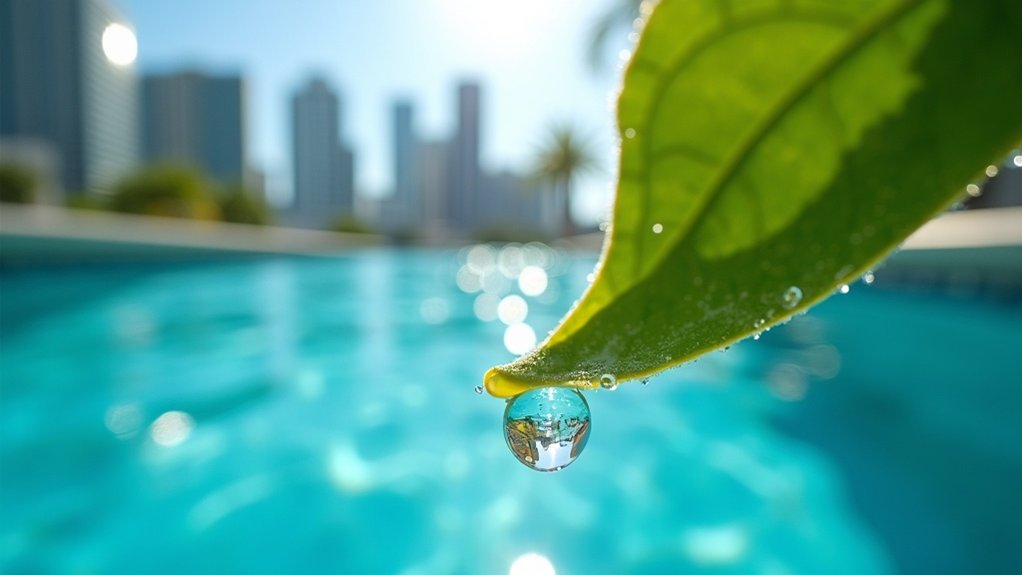
In Miami, water hardness levels typically fall between 120 to 150 parts per million (ppm), which classifies the water as very hard. In some cases, the average hardness can reach around 220 ppm, significantly surpassing the national average. This promoted hardness is primarily due to the high concentrations of calcium and magnesium ions found in the local water supply.
Understanding water hardness is important for homeowners, as it can lead to a few common issues. For instance, hard water often results in scale buildup in appliances, which can affect their efficiency and lifespan. It may also cause dry skin and leave spots on dishes after washing.
However, it’s essential to emphasize that hard water is safe to drink. The minerals that contribute to hardness, while they may pose some challenges, aren’t harmful to your health.
Managing the effects of hard water in your home can be straightforward. For example, using water softeners can help reduce mineral buildup, and adjusting your cleaning routine can minimize the impact on your skin and household items.
Testing Water Hardness at Home
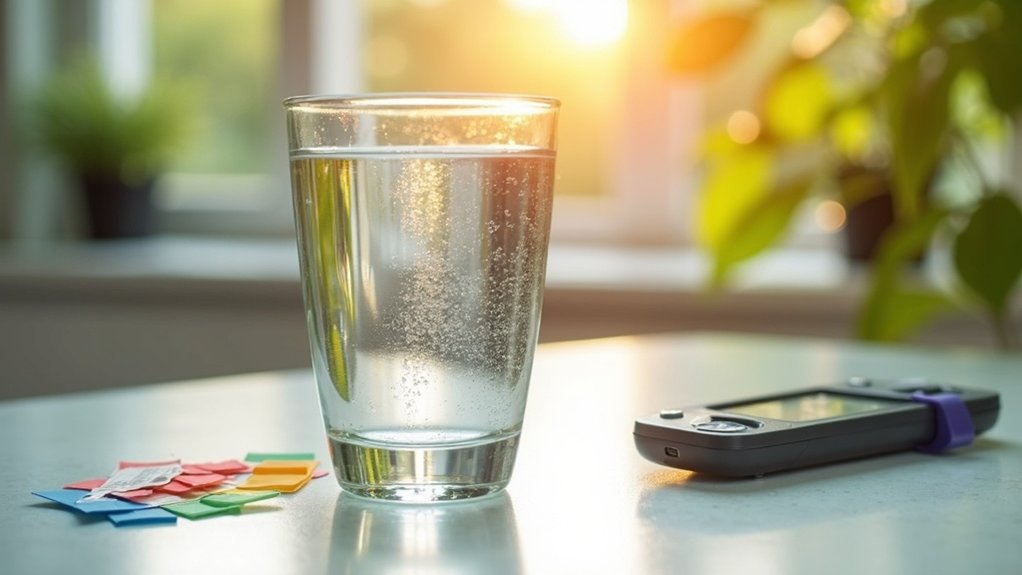
To assess the hardness of your water at home, using test strips is a straightforward and effective method. These strips, which you can find at local home improvement stores, allow you to quickly gauge your water’s mineral content. In Miami, for example, the average water hardness falls between 150 to 220 parts per million (ppm), categorizing it as very hard water.
If you’re looking for more detailed information about your water quality, consider sending a sample to a certified laboratory for analysis. Regular testing is advisable, especially if you observe signs of hard water. These signs can include scale buildup on fixtures or dry, irritated skin.
Understanding your water hardness is essential, and the table below offers a clear guide to interpreting your test results:
| Hardness Level (ppm) | Classification | Recommended Action |
|---|---|---|
| 0 – 60 | Soft | No action needed |
| 61 – 120 | Moderately Hard | Consider using a water softener |
| 121+ | Hard | Implement water treatment methods |
Effects of Hard Water on Homes and Health
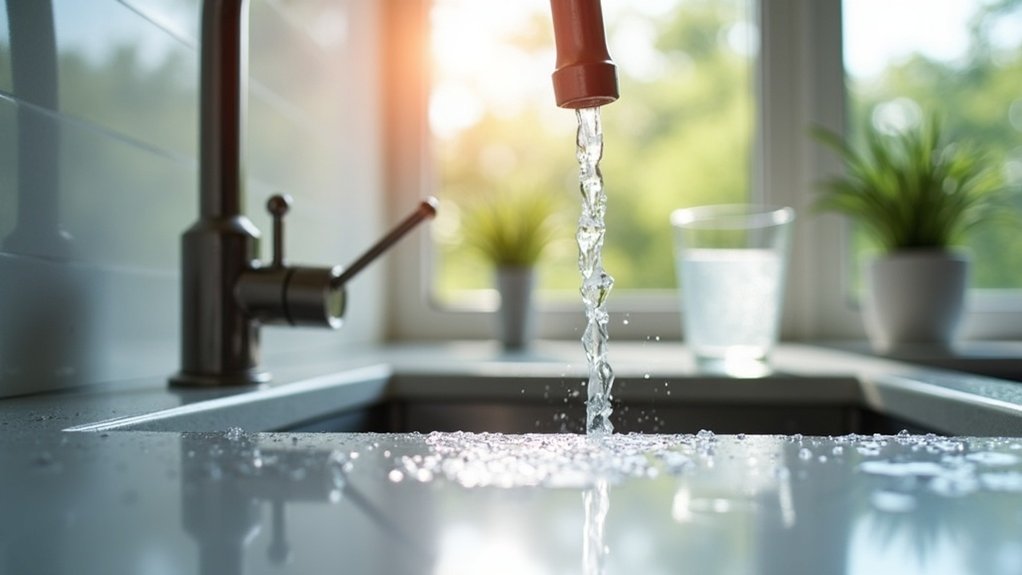
Hard water in Miami can affect both your health and home in various ways.
For instance, you might experience skin irritation or hair problems because of the minerals present in the water. Additionally, appliances can accumulate scale buildup, which could lead to expensive repairs down the line.
Being aware of these effects can help you choose the right water treatment solutions for your needs.
Now, let’s take a closer look at some practical options available to address hard water issues.
Health Impact Overview
Hard water, while not directly harmful to your health, can have significant effects on both your skin and your household maintenance routines.
In Miami, where water hardness typically ranges from 120 to 150 ppm, the high concentrations of calcium and magnesium can lead to noticeable dryness and irritation for many people. These minerals can strip away the natural oils from your skin and hair, resulting in rough skin and dull hair.
Additionally, hard water can impact the effectiveness of soaps and shampoos. You may notice that they don’t lather as well or may leave a slimy residue. This can make it more difficult to achieve the desired cleanliness and comfort during your bathing and washing routines.
To alleviate these issues, it’s essential to implement regular maintenance practices in your home.
For instance, consider installing a water softener to reduce mineral buildup, or routinely clean faucets and showerheads to minimize the impact of hard water. By taking these steps, you can improve both the quality of your personal care routines and the overall functionality of your household.
Home Maintenance Challenges
Miami homeowners often encounter significant challenges due to the high mineral content in the local water supply, commonly referred to as hard water. With mineral levels ranging from 120 to 150 parts per million, hard water can lead to scale buildup in plumbing systems and appliances. This accumulation can result in clogged or slow-draining pipes, which may require the expertise of a professional plumber to resolve.
Furthermore, the presence of hard water can necessitate more frequent cleaning of fixtures and appliances to prevent unsightly watermarks and residue. This not only affects the aesthetic appeal of your home but also increases the time and effort needed for regular maintenance.
In addition to impacting household maintenance, hard water can have effects on personal care. Many residents find that it can lead to dry skin and hair due to the minerals present in the water. This is an important consideration, especially for families with sensitive skin or those who prioritize skincare.
To manage the challenges of hard water effectively, homeowners can consider options such as water softeners, which help reduce mineral content and alleviate some of these issues. Regular maintenance and cleaning routines can also mitigate the effects of hard water, making certain that your home remains comfortable and visually appealing.
Appliance Longevity Issues
Living in Miami comes with the challenge of dealing with hard water, which has a high mineral content that can significantly affect the longevity of your home appliances.
This mineral buildup can lead to several issues that may impact both the performance and lifespan of your devices. Here are a few key points to consider:
- Reduced Lifespan: Hard water can cause appliances like dishwashers and washing machines to wear out more quickly. Over time, the accumulation of minerals can lead to inefficiencies, resulting in the need for earlier replacements.
- Clogged Pipes: The minerals in hard water can create scale buildup within your plumbing. This buildup can restrict water flow, potentially leading to plumbing problems and costly repairs down the line.
- Increased Maintenance Costs: Appliances that operate with hard water often require more frequent repairs and cleaning. This can lead to higher maintenance expenses, which can add up over time.
- Necessity for Descaling: To keep your appliances functioning efficiently, regular descaling is essential. This maintenance step helps remove mineral deposits and can prolong the life of your appliances.
To combat these challenges, investing in a water softener can be a wise choice.
Water softeners help reduce the hardness of your water, minimizing the negative effects on your appliances. Additionally, incorporating regular descaling into your maintenance routine can keep your appliances running smoothly.
Common Solutions for Reducing Hard Water Issues
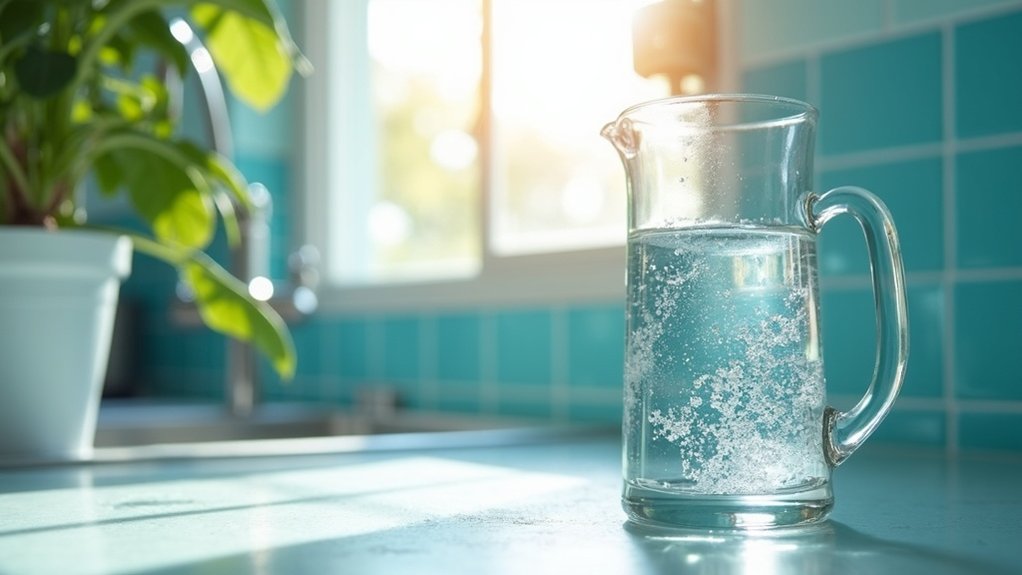
Miami’s water hardness often falls between 120 to 150 parts per million (ppm), which can lead to various challenges in maintaining water quality at home.
One effective way to tackle these issues is by installing a water softener. This device works by replacing the calcium and magnesium ions—minerals that contribute to water hardness—with sodium or potassium ions. As a result, you can enjoy softer water, which helps reduce scale buildup in pipes and appliances.
Another option to consider is a reverse osmosis system. This filtration method effectively removes impurities from your water, improving its overall purity and taste.
For those looking for an environmentally friendly solution, HydroFLOW offers a system that prevents mineral adherence without the need for added salt, making it a great choice for maintaining water quality.
It’s also important to regularly maintain and inspect your water treatment systems. Doing so confirms their effectiveness and helps prevent plumbing issues, protecting your home from the negative impacts of hard water.
Resources for Miami-Dade WASD Consumer Confidence Report
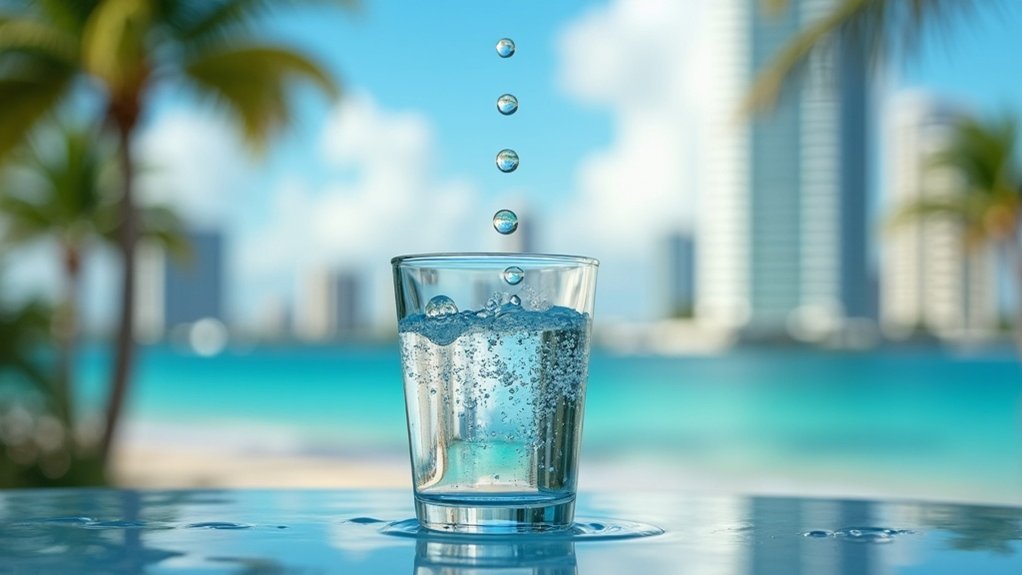
Accessing the Miami-Dade Water and Sewer Department’s (WASD) Consumer Confidence Report is essential for residents who want to stay informed about the quality of their drinking water. This annual report provides valuable information that can help you understand the safety and reliability of your water supply.
The report covers several key areas:
- Water Sources: It details the sources from which your drinking water is obtained, helping you to understand the origin of the water you consume.
- Treatment Processes: You can learn about the methods used to treat the water, confirming it meets safety standards for public health.
- Contaminants: The report lists any contaminants that have been detected and discusses their potential health effects, allowing you to make informed decisions regarding your water consumption.
- Hardness Levels: Miami’s water hardness typically ranges from 120 to 150 parts per million (ppm), which is classified as very hard. Understanding hardness is important, as it can affect everything from plumbing to soap efficiency.
WASD encourages all residents to review this report online. By doing so, you can stay updated on water quality, address any concerns about hardness or contaminants, and make sure that you’re informed about the safety of your drinking water.
This proactive approach helps you take control of your water quality and health.
Best Practices for Maintaining Water Quality at Home
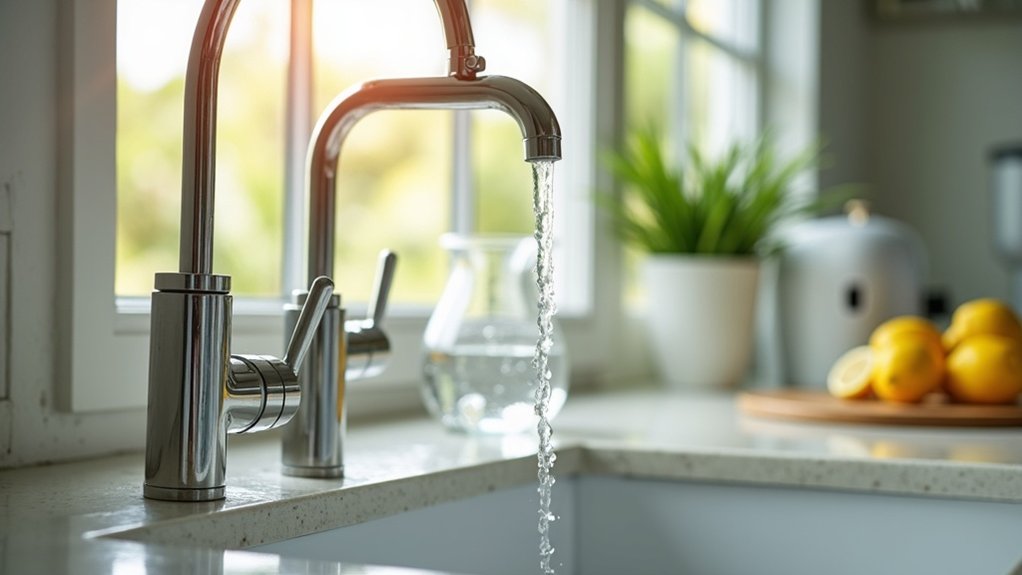
To maintain optimal water quality at home, it’s important to follow best practices that address both water hardness and potential contaminants.
First, regularly test your water supply for hardness; in Miami, the average can reach around 200 mg/L. If you find that your water is hard, consider installing a water softener. This can help reduce mineral buildup, which not only extends the lifespan of your appliances but also benefits your skin and hair health.
It’s also a good idea to clean your fixtures and appliances regularly. Using vinegar or descalers can effectively combat scale deposits caused by hard water.
Additionally, keep an eye on your soap and detergent usage. Hard water can reduce their effectiveness, often resulting in cloudy dishes or less effective cleaning.
Lastly, think about implementing a whole-home water filtration system. This can address multiple water quality concerns, confirming you have soft water while improving overall comfort in your household.

